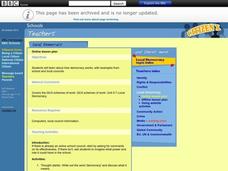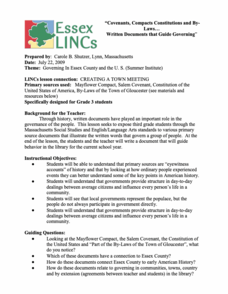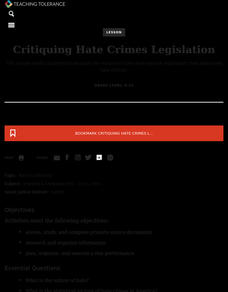C-SPAN
What Are Ways for Youth to Engage in Politics?
Help young people become excited to participate in politics. High school historians participate in an engaging lesson plan focused on ways for youth to become involved in government. Scholars review articles, videos, and essential...
Curated OER
Public Policy Research
Students explore a public policy issue of local importance. Through research and survey, they identify a public policy issue affecting people in their local area. Students determine how this issue affects the lives of those involved and...
Curated OER
Government Goods and Services
Fifth graders investigate the connection between taxes and government services. In this economics lesson, 5th graders discuss the process and benefits of paying sales and income taxes. Using calculators, students compute the amount of...
Curated OER
Government Lesson Plan - Number 14
Students analyze data on air pollution in Maryland. They evaluate the effectiveness of government actions to improve air quality. Each group recommends actions that would improve air quality on the federal, state and local level.
Judicial Branch of California
Defining Civic Duty and Participation
A lesson, geared toward older elementary scholars, combines art with social studies to explain the purpose of civic duty and how to encourage others in the community to participate. Academics create advertising campaigns to promote civic...
BBC
Local Democracy
Middle and high schoolers explore how democracy works. After a teacher-led discussion, pupils go to websites embedded in the plan which lead them through activities that are all about the democratic process. The first website has them...
Curated OER
Government
Second graders run for various offices. They dress up like a politician, pretend to be running for an office, and tell the students why they should vote for him/her. They explain why it is necessary for a community to have a government
Curated OER
Covenants, Compacts, Constitutions and By-Laws... Written Documents that Guide Governing
Third graders discuss documents in our government. In this government lesson, 3rd graders look up vocabulary words and illustrate them. They examine a historical document to discuss and answer questions.
iCivics
Step One: We've Got Issues
What is the most pressing issue in your community? The resource helps you and your middle schoolers begin the process of doing something about it! Learners compare and contrast two pressing issues in their local counties by reading two...
American Bar Association
What Is Separation of Powers?
Who has the power? Scholars investigate the creation of the three branches of government in the United States Constitution. They analyze just why the framers created the branches the way they did.
Constitutional Rights Foundation
270 Votes to Win: The Electoral College in the United States
What exactly is the Electoral College and how does it work? The lesson plan is part of a larger series on government that explains what the Electoral College is and how it helps determine an election winner. Academics participate in...
Teaching Tolerance
Critiquing Hate Crimes Legislation
The high school lesson explores what hate crimes are and how the government has responded to those crimes. Academics read legislation, analyze political cartoons, and complete hands-on-activities to understand what motivates individuals...
Curated OER
Express Your Opinion
Students explore local, state, and national levels of government and discuss which level of government they should contact to get information, express their opinions, or get help on specific issues.
Curated OER
Citizenship and the Constitution
Students identify government officials and resources on a local, state and national level. They determine the structure of local, state, and national governments.
iCivics
Step 1: Change the World?
Want to change the world? Where do you begin? Scholars analyze the steps that must take place to make change in society. The first installment of a 10-part County Solutions - High School series brings the real world to the forefront as...
School Improvement in Maryland
Pollution Data
Smog? Vog? What is being done about air pollution? Government classes investigate federal and state programs designed to improve air quality, and then develop a proposal for further actions that are needed.
Curated OER
Executive Branch of the U.S. Government
Fourth graders create a K-W-L chart of what they know about the executive branch of government. They access the Internet to research a specific level of government. They create a PowerPoint presentation with a minimum of eight slides.
Curated OER
Local Leaders
Second graders recognize the importance of having community leaders. In this community leaders instructional activity, 2nd graders find local leader names and local leader news items. Students answer questions and create a graphic...
iCivics
The Fourth Branch: You!
Take time to remind your young learners of the valuable understanding that each branch of the United States government is really composed of other citizens. The reading material and worksheets of this resource cover the importance of...
Constitutional Rights Foundation
Why Don’t More People in the U.S. Vote?
To vote or not to vote, that is the question. Secondary scholars explore voter turnout in the United States. The resource uses informational text, group discussion, and a worksheet to help academics understand hindrances to voting and...
School Improvement in Maryland
Building a Pyramid
After reviewing the structure and powers of the three branches of the US government, groups investigate a problem and research what is being done to address this criticism.
Curated OER
Separation of Powers
Students compare the role of federal and local government. In this government activity, students watch "Separation of Powers." Students discuss the federal and state powers prior to participating in a simulation that requires them to...
Curated OER
State of Affairs
Students examine the various roles and duties of state government officials and offices to create an Informative Guide to Our State's Government. They explore the changing relationship between governor and lieutenant governor in New York.
Oakwood Publishing
Workshop 4: Constitutional Convention
How do new amendments become part of the US Constitution? AP government students explore, analyze, and use the US Constitution to develop a deep understanding of the interworkings of law and government while practicing synthesis and...
Other popular searches
- Define Local Government
- Local Government and Taxes
- Texas Local Government
- Local Government Taxes
- Local Government Florida
- Local Government Grade 3
- State and Local Governments
- Local Government Agencies
- Mayor Local Government
- Local Government in Idaho
- Local Government in Georgia
- Local Government Lesson Plans

























